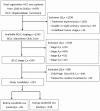Role of reimbursement and Physicians' awareness in the survival of sorafenib-eligible advanced hepatocellular carcinoma patients
- PMID: 38695728
- PMCID: PMC11895626
- DOI: 10.1002/kjm2.12838
Role of reimbursement and Physicians' awareness in the survival of sorafenib-eligible advanced hepatocellular carcinoma patients
Abstract
In 2008, sorafenib became the first approved systemic therapeutic agent for advanced HCC. Although its pharmacological efficacy has been established, reimbursement for such a new, high-cost drug, as well as physicians' awareness and prescription practice, likewise contribute to its clinical effectiveness. We therefore conducted a retrospective study using 38 sorafenib-eligible, advanced HCC patients when sorafenib was approved but not yet reimbursed as a control and 216 patients during the reimbursed era. Study group showed longer survival at 8.2 months versus the control's 4.9 months (p = 0.0063 hazard ratio: 0.612 [0.431 ~ 0.868], p = 0.0059). Among the 42 (19.4%) patients who survived more than 2 years, 50% had tumor rupture, and all 32 patients with portal vein tumor thrombus and/or extrahepatic metastasis received sorafenib (p = 0.003). Furthermore, during their first 2 years of HCC management, sorafenib had been given in 29.1% of the treatment courses among survivors between 2 and 5 years while it was prescribed in 55.8% among the more than 5 years survivor group (p < 0.001). In conclusion, survival of sorafenib-eligible HCC patients significantly improved after reimbursement. Patients who underwent longer sorafenib treatment had a survival advantage, except for those with tumor rupture. Reimbursement and awareness of prescriptions for a newly introduced medication therefore improve clinical effectiveness.
Keywords: clinical effectiveness; hepatocellular carcinoma; pharmacological efficacy; reimbursement; sorafenib.
© 2024 The Authors. The Kaohsiung Journal of Medical Sciences published by John Wiley & Sons Australia, Ltd on behalf of Kaohsiung Medical University.
Conflict of interest statement
The authors declare no conflict of interest.
Figures



Similar articles
-
Pravastatin combination with sorafenib does not improve survival in advanced hepatocellular carcinoma.J Hepatol. 2019 Sep;71(3):516-522. doi: 10.1016/j.jhep.2019.04.021. Epub 2019 May 22. J Hepatol. 2019. PMID: 31125576 Clinical Trial.
-
Determinants of survival after sorafenib failure in patients with BCLC-C hepatocellular carcinoma in real-world practice.Medicine (Baltimore). 2015 Apr;94(14):e688. doi: 10.1097/MD.0000000000000688. Medicine (Baltimore). 2015. PMID: 25860213 Free PMC article.
-
Sorafenib prescribed by gastroenterologists and hepatologists for hepatocellular carcinoma: A retrospective, multi-institutional cohort study.Medicine (Baltimore). 2018 Jan;97(4):e9757. doi: 10.1097/MD.0000000000009757. Medicine (Baltimore). 2018. PMID: 29369224 Free PMC article.
-
Sorafenib versus hepatic arterial infusion chemotherapy for advanced hepatocellular carcinoma: a systematic review and meta-analysis.Jpn J Clin Oncol. 2019 Sep 1;49(9):845-855. doi: 10.1093/jjco/hyz069. Jpn J Clin Oncol. 2019. PMID: 31063184
-
Pharmacogenetics of the systemic treatment in advanced hepatocellular carcinoma.World J Gastroenterol. 2019 Aug 7;25(29):3870-3896. doi: 10.3748/wjg.v25.i29.3870. World J Gastroenterol. 2019. PMID: 31413525 Free PMC article. Review.
References
-
- Sung H, Ferlay J, Siegel RL, Laversanne M, Soerjomataram I, Jemal A, et al. Global cancer statistics 2020: GLOBOCAN estimates of incidence and mortality worldwide for 36 cancers in 185 countries. CA Cancer J Clin. 2021;71(3):209–249. - PubMed
-
- WHO . World health statistics 2021: monitoring health for the SDGs, sustainable development goals. https://www.who.int/publications/i/item/9789240027053/;2021 [accessed13 October 2023].
-
- Liao SH, Chen CL, Hsu CY, Chien KL, Kao JH, Chen PJ, et al. Long‐term effectiveness of population‐wide multifaceted interventions for hepatocellular carcinoma in Taiwan. J Hepatol. 2021;75(1):132–141. - PubMed
MeSH terms
Substances
LinkOut - more resources
Full Text Sources
Medical

